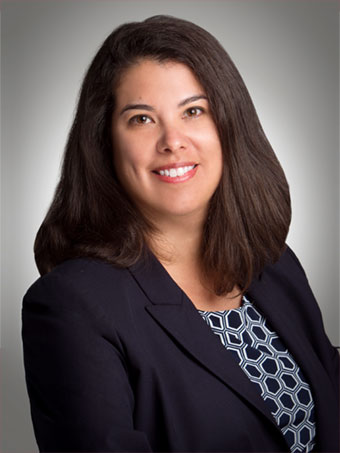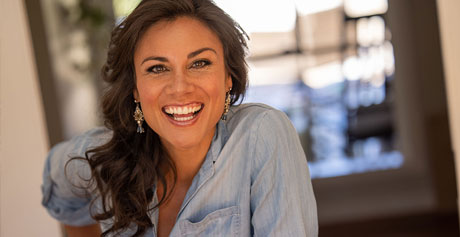Promoting Professional & Leadership Development of Latinas, Patricia Diaz, Executive Director of the Chicana Latina Nonprofit Foundation
 Q: How did you get involved in the nonprofit sector?
Q: How did you get involved in the nonprofit sector?
PD: I wanted to make a difference and give back to the community and felt the nonprofit sector was aligned with my values. I started off my career providing direct services in education to migrant children and immigrant families in the Salinas and Pajaro Valleys. Being a child of immigrant parents and wanting to give back to my community, I decided to pursue a master’s in social work with a focus in serving low-income Latino children as a therapist. As I was pursuing my degree, I gained a better understanding on how policies impact low-income families and decided to concentrate my career in policy advocacy and community building. For the past 20 years, I’ve worked in the nonprofit sector advocating for improving the lives and opportunities of Latino and immigrant families. It’s my passion and it’s personal.
Q: Tell us about your time with the SIREN organization … what changes did you bring about in your role as Executive Director?
PD: SIREN, an immigrant rights organization in San Jose and will always be close to my heart. I first started working at SIREN as their policy director. I’m so grateful for SIREN providing me the space and tools to learn how to bring the voice of the immigrant community on issues that are impacting them. I left SIREN to continue advocating for the Latino community in Sacramento with UnidosUs (formerly National Council of La Raza) and Latino Coalition for a Healthy California. I was happy to return to SIREN as their Executive Director in 2005. During my ten years at SIREN, I brought the organization to financial stability, reorganized its program priorities, and partnered with key statewide and national partners that led to victories for immigrants and their families. This couldn’t have happened without having a dynamic and dedicated Board and staff.
Q: In your current position as Executive Director of the Chicana / Latina Foundation, can you share with our audience the foundations mission?
PD: The mission of the Chicana Latina Foundation (CLF) is to empower Latinas and Chicanas through personal, educational and professional development. We invest in helping Latinas find their own path to success and open a path for others. It’s about cultivating leadership so that they have the confidence and skills to succeed in college, career and life.
Q: What has been the impact of Chicana / Latina Foundation in the Bay Area since its inception in 1977?
PD: The Chicana Latina Foundation was founded by three Latinas attending UC Berkeley who found the need to support other Latinas pursuing higher education. As first-generation college students, they realized the importance to come together to support each other and future generations of Latina college students.
As of today, CLF has awarded nearly $1 million dollars in scholarship assistance to over 600 low-income and first-generation Latina college students in Northern California. Of this number, 400 scholarship awardees have participated in CLF’s leadership institute to succeed as leaders in social change.
In 2015, CLF conducted a survey to its alumnae and found that CLF doubled the rate of educational attainment compared to Latinos statewide average.
Q: Tell us about your role as Executive Director of the foundation.
PD: I joined CLF in January 2018. As their Executive Director, I’m responsible for the agency’s leadership and oversee program and organizational management, resource and fund development, financial operations and administration, and the management and evaluation of personnel.
During my time at CLF, I am amazed by the love, community and support that underlies everything we do. CLF is successful because at the core of its work is an inherent love for the women we serve and a desire to serve as their cornerstone as they seek to grow as individuals and as leaders. When we provide a scholarship, we are saying “we believe in you.” When we provide our leadership program, we are helping them find their voice and make their words powerful and impactful. And what results, is a group of activated women who are involved in our communities and effecting change. Our participants and alumnae are powerful Latinas who will transform our future.
Q: What are some of the goals you would like to achieve for the foundation?
PD: First, it’s an honor to be able to follow in the footsteps of Olga Talamante and to receive so much love from the CLF board and community. As its first Executive Director, Olga led CLF for the last 15 years to be a respected and effective organization in building the power of Latinas.
With 40 years of investing in the leadership of Latinas, my goal is to listen and learn what has made CLF programs effective and through partnerships with the board, staff, alumnae, and supporters. I look forward to building onto that success to take it to the next level. It’s a great opportunity to reflect on our past and current work and the impact we want to make in the future. I’m excited of the endless opportunities.
Q: Can you share with our audience your most memorable achievement in your career?
PD: Obtaining my college degrees. I’m the first one and the only one in my family that graduated from college. My parents and siblings made sacrifices so that I could go to college. Because of that I am forever grateful to my family and completely understand what first-generation college students go through. When you receive that college degree, it has your name but it’s a family accomplishment.
Q: What’s one leadership lesson you’ve learned in your career that you can share with our audience?
PD: Embrace your cultural identity. This is what makes you a leader and better able to serve your community. As a woman and person of color, I’m strongly attached to my cultural identity. I had been to numerous leadership trainings that were very much related to skill acquisition. While they were very helpful, it didn’t get to the deep core of your identity.
Growing up in the 70’s, my culture was not seen as an asset. The messaging we are hearing from the administration about Mexicans is similar to what I heard growing up. Oftentimes we internalize these beliefs and thoughts and they affect how we “show up.” After going through the Rockwood leadership program, I embraced my identity as a proud second-generation immigrant from the Salinas Valley. I learned from my immigrant parents and relatives to be courageous and brave, resilient, determined, and compassionate. This is what it means to be an immigrant.
And that is why I’m grateful my journey landed me to the Chicana Latina Foundation. Their leadership program develops the student’s awareness and positive identification with the Latinx community by engaging them in the process of framing their individual stories of their past experiences from a deficit to an asset. We help our students build a strong cultural identity and pride in their heritage that propels their leadership and passion to create positive change.
Q: Which woman inspires you and why?
PD: It’s not necessarily one person but all the women in my family and relatives inspire and motivate me - My mom, sisters, tias (aunts), and primas (cousins). They are all immigrants or children of immigrants. They are all strong, determined and hardworking mujeres (women). They are my foundation.
Q: What are some of the challenges you feel women face today?
PD: As a Latina, we still face discrimination and gender stereotypes. In just 12 years, Latinas will make up the largest share of California’s workforce. Even though Latinas college graduation rates are increasing, far too many Latinas live in poverty and have the lowest median earnings. Keeping Latinas unprepared and things as they are, is a reality we cannot afford.
Q: What advice would you give to young women who want to succeed in the workplace?
PD: First, be true to who you are by embracing your identity and culture with pride. What you have to offer is vital and needed. You deserve to be at the table and your voice matters.
Next, build a network of people you trust to be vulnerable. Have people in your circle who will support and uplift you and provide honest feedback with love. These are people who will help you through your growth and development. We’re always learning regardless of our age.
Finally, take care of yourself both physically and mentally. Self-care is so important to be able to give your best, and I recommend integrating this at an early age. Self-care shows that you value yourself.
Q: What do you like the most about living in the Bay Area?
PD: The food! My children are such foodies. When we moved to Eastern Washington, I learned how to cook Mexican and Indian foods – our favorite! I never learned how to cook and joke how my husband taught me how to boil chicken.
Five Things About Patty Diaz
1. If you could talk to one famous person past or present, who would it be and why?
The first time I learned about Frida Kahlo was in high school in my Spanish class. I was drawn to her because of her strength, resiliency, and determination. Even though Latinos were a majority in my high school I wasn’t taught about my culture, my history or my ancestors. It took a Spanish class for me to learn about my history.
2. What app can’t you live without?
I’m not an app person. However, I am someone who gets easily disoriented. I heavily rely on google maps for directions. My son recently asked me what I did back in the “olden days” when we didn’t have google maps on my phone.
3. If they made a movie of your life, who’d play you?
This is a hard one. If I had to choose, I would go with America Ferrera or Eva Longoria – they both are committed to the Latino community and Eva grew up in a rural area like I did.
4. Who had the most influence on you growing up?
My teachers. Educators play a critical role in a child’s life from elementary to college. We grew up being told that we had to listen to our teachers. So, what a teacher says to their students can have a great impact – positive or negative. I still remember the positive comments I received from my teachers that made me believe in myself.
5. What inspires you?
Mi comunidad – my community – which I define as my family, Latinx, people of color, immigrants/refugees, and farmworkers. They’ve been through some harsh adversities and I admire their strength and determination and ganas. When there are times that I feel defeated, I remember mi comunidad and I try to be the best person I can be at this moment.

